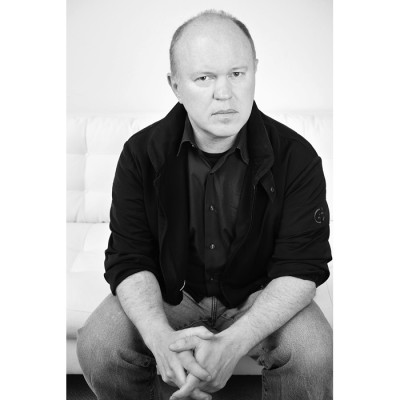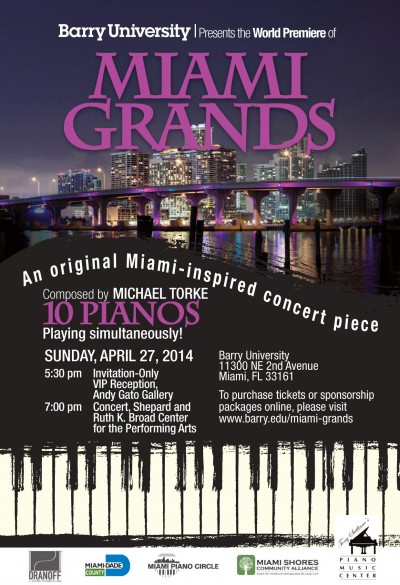
Composer Torke evokes Miami, 10-piano style
There’s a relatively short list of music that pays tribute to the city of Miami, but this weekend at Barry University, the list will grow by 10 pianos at a single stroke.
Michael Torke, whose accessible, melodic music has made him one of the most celebrated American composers of his generation, has written a new piece for 10 pianos (and 20 hands) called Miami Grands, a 12-movement suite that chronicles a day in Miami from dawn on Key Biscayne to midnight on South Beach, followed by a stargazing expedition out on the River of Grass.
The work will have its world premiere Sunday night at Barry’s Broad Center for the Performing Arts, and will be presented by eight members of Mia Vassilev’s Miami Piano Circle and the Stephanie & Saar piano duo, fresh from a jazz performance last week at the South Miami-Dade Cultural Center in Cutler Bay.
Torke, whose works have won effusive critical praise and public affection as measured on the Billboard classical charts, says he’s been pleasantly surprised by the advance buzz for the piece from people with whom he’s discussed it.
“A salesman, a passenger on Delta Airlines — everyone I’ve talked to about this project says it’s something they want to hear. Not my opera, not my ballets; it’s this project that sounds more interesting,” said Torke, 52, a native of Milwaukee who studied at the Eastman and Yale schools of music, speaking from his home in Las Vegas.
Torke said he first met Vassilev, the originator of this project and a teacher at Barry, when she was the rehearsal pianist for a University of Miami production of his one-act opera, Strawberry Fields. “She had a natural feel for the style of my music, and so I asked her whether she’d be interested in being the rehearsal pianist for a piece I was workshopping at the Metropolitan Opera,” he said.
She was, and “she did a fantastic job,” said Torke, who also has a home in Manhattan.
Mia Vassilev.
Vassilev has presented several 10-piano shows over the past few years, a kind of entertainment that has a distant ancestor in the “monster concerts” that were a popular United States fad in the years immediately following the Civil War. She and her Miami Piano Circle partnered with Barry University for this idea, which she pitched to Torke in an email.
“I told him we wanted it to be Miami-based, to explore the geography of Miami, and he thought that was really interesting,” she said. Torke adds that Vassilev had some specific ideas about what parts of the city should be evoked in the piece, such as the Biscayne Bay sea village known as “Stiltsville (mid-afternoon),” the seventh movement, which is represented by a warmly nostalgic ballad, and “Mojitos and Stilettos (night),” the 10th movement, which evokes the clubbing life with a samba.
Miami Grands lasts about 50 minutes, and a perusal of the score and a hearing of it in a MIDI realization show much of it to be classic Torke: A steady rhythmic pulse is topped by memorable motifs that accrete slowly and build powerfully to a climax.
For example, the first movement, “Key Biscayne (dawn),” is in an unambiguous D-flat major, with a steady, pop-like progression in the lower registers that leads to a series of urgent melodic fragments, all reaffirming the key, and a broader, wider version of the melodies that centers around C and D-flat. The third, “Little Haiti (mid-morning),” is in D major, and opens with bubbling broken triads that establish a busy, positive atmosphere. A persistent downward-scale theme alternates with scales running upward and big syncopated chords, all of it over a progression that again evokes pop music until it fades away, ending on the dominant rather than the tonic.
Torke, whose well-known Javelin (1994) was commissioned by the Atlanta Olympics Committee, went to music school at a time when atonal music was still de rigueur for young composers, though one of Torke’s teachers, Joseph Schwantner, was already beginning to break away. Torke’s brand of minimalist-inspired composition, quickly called “post-minimalism,” came like a breath of fresh air to audiences used to the post-Webern approach of the academy.
“It was a kind of departure, but there were things in the air, after the minimalism of (Steve) Reich and (Philip) Glass, people like Joe Schwantner experimenting in a pan-diatonic style, and David Del Tredici in the mid-1970s returning to Wagner and (Richard) Strauss,” Torke said. “All of that was in the air and talked about at the time, so the idea of writing something that would be melodic and rhythmic was not seen as anything that bizarre.”
But while at Eastman, Torke examined three different works to see what kind of impact they had on him as a listener. The first, Italian modernist Luciano Berio’s Two-Piano Concerto, was more cerebral, while the second, Tchaikovsky’s Fourth Symphony, was more direct. The third, Michael Jackson’s Thriller album, then brand-new, made its impact on a more visceral level, he said.
That led him to the conclusion that there were advantages to all three, and that there was nothing verboten about music that people could actually enjoy (though he pointed out that he wasn’t a rock fan growing up and isn’t much of one today). That also led him to question the conventional music history wisdom that a composer like Beethoven was a tortured, misunderstood genius who was unappreciated in his own day and conclude that this was nothing more than a myth, he said.
“They swooned over his music,” he said of Beethoven’s contemporary audiences. “And a piece like the Seventh Symphony is great all the way down: You could enjoy it, and it lasted because in addition to that, it had depth.”
The “Miami Grands” flyer.
Miami Grands will be accompanied by a slideshow compiled by Silvia Lizama, chairwoman of Barry’s Fine Arts Department, and Sara Ryttke, a Barry photography professor. Vassilev said the photos will be of Miami skies at different times of day and night, to mirror the time and places addressed in Torke’s piece.
Vassilev said she “likes the fusion” of Torke’s music, which marries strict classical procedures and thematic material of direct popular appeal.
“I think people will walk out of the concert actually remembering some of these themes, and not walk say out saying, ‘I don’t know what I just listened to,’” she said.
Vassilev will be one of the 10 pianists, along with Saar Ahuvia and Stephanie Ho (the Stephanie & Saar Duo) , Dionsio Camacho, Kristin Camacho, Asiya Korepanova, Alan Ngim, Stepan Rudenko, Daniel Manoiu and Jamila Tekalli. The ensemble will be conducted by Georgi Danchev.
Sunday night’s concert at the Broad Center will be preceded by a VIP reception at 5:30 p.m. and a general reception at 6 p.m. The concert will begin at 7 p.m. Tickets are $20 (or $100 for grand seating); for more information call 305-899-3178 or visit www.barry.edu/miami-grands.
Recent Content
-
Artsarticle ·
-
Artsarticle ·
-
Artsarticle ·


